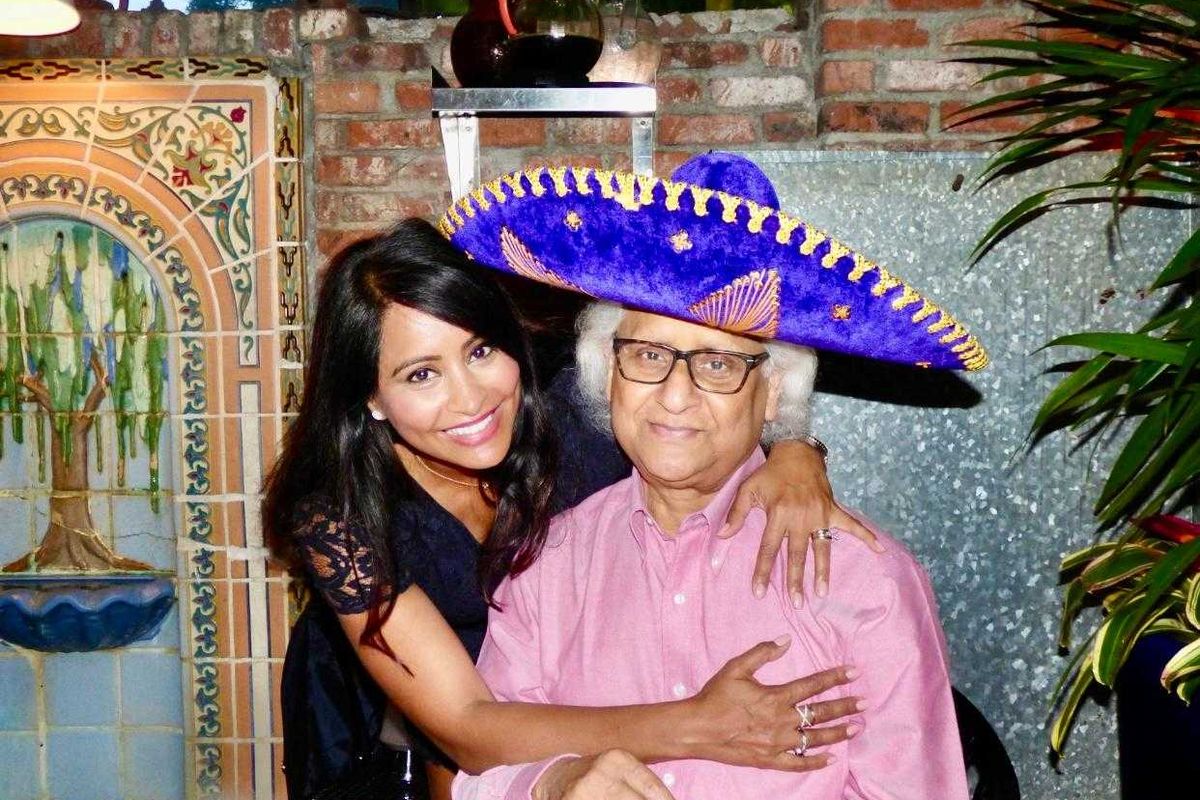Woman is overjoyed to see her dad cameo in a viral video about kindness after he passed away
"He would have loved to see this go viral (even though he neither knew what a reel was or what going viral meant!)"
Raakhee Kumar poses with her dad.
Sometimes worlds collide in the most magical ways. This was the case after a TikTok trend called "Drive-by Kindness" went viral, encouraging people to randomly praise complete strangers. The way it works is this: People drive around, roll down their car windows and tell strangers how lovely they look. It's that simple. And it's that beautiful. Hashtags like #Spreadlove, and #DrivebyKindness are gaining in popularity by the minute.
After a woman named Melissa Hackworth posted one of the moving TikTok compilations (made by user @Aurora.aeo) on her Instagram page, she wrote in the captain, ""Gracie does this EVERY time we go somewhere. She will give the cashier or a random stranger a compliment, and they are always SO happy after."
@aurora.aeo Praise passers-by💕#drivebykindness#normalizekindness#speeadkindness #bekind#fyp
Happy barely even begins to describe it. There's clip after clip of truly generous people giving compliments out like the law depended on it. From lines like "Do you have an inhaler? Cuz you took my breath away," and "Do y'all work at Fed Ex by any chance? Cuz y'all are delivering looks today!" the joy this trend spreads is palpable.
Each time, the recipient(s) of the compliment seems surprised and then directly overwhelmed with gratitude. The tiniest words make the biggest impact. To one woman walking her dog, someone states, "I love that shirt on you. It looks really good." The woman smiles but stands a bit stunned. She shifts her body and says, "Oh damn. No one's ever said that. Well thank you!"
And the compliments are given lovingly to both men and women. To one man wearing a spiffy white shirt, suspenders, and a fashionable tie, we hear a voice ask, "Is your middle name Cheddar cheese? Because your outfit is really SHARP." He smiles and says in earnest, "Oh! Thank you so much! You should see me with my coat on!"
@miao11636 #spreadlove #kindness #fyp #love
At the very end of one of the compilations, something miraculous happens. A man wearing an orange and white striped shirt with gorgeous flowing white hair walks by. Our kindness-giver says, "Your hair today looks so amazing."
He laughs, "Haha. I can't believe this!" They tell him they love him. And he says it back with total conviction. "I love you too," he says, his positivity matching theirs perfectly.
There are over 1.3 million likes on Hackwork's re-share alone, with thousands of supportive commenters who seem moved by this outpouring of positivity. But one comment in particular stood out. A woman named Raakhee Kumar wrote, "That’s my dad at the end!!!! He passed this March. This was so incredible to see. Please don’t delete it. ❤"
Upworthy reached out to Kumar to find out how she stumbled upon such a precious moment captured in time and how it has affected her. She shares, "A childhood friend from NOLA sent it to me on Saturday when there were 350k views, as it popped up in his reels. He was close to my dad too so he was equally stunned!"
Seeing her father smile after he passed this year was incredibly moving. She tells us, "It immediately brought me to tears seeing my dad’s radiant smile and hearing him giggling at the compliment. I was so grateful for the joyful memory that truly captured his personality and warm, vivacious spirit. But also, I was so moved by the kindness of total strangers reaching out to my dad and paying him a compliment. I know they made his day and he would have loved to see this go viral (even though he neither knew what a reel was or what going viral meant!)"
@aurora.aeo #deivebykindness #normalizekindness #speeadkindness #foryoupage
And what's even more serendipitous? Her father (known by most as Dr. B.) had been concerned about losing his hair after getting diagnosed with cancer. "He worried about losing his hair because that was such a part of his look and persona (unique and memorable!). It was literally his crown of glory, so I just know he really loved that comment. But I am especially so grateful for the kindness shown to my dad—I don’t know when this was filmed but he went through a lot in the last year of his life. And I can only imagine what a boost this compliment and memory gave him and continues to give me and now over a million other strangers. So a million thanks to the creators and all of the sweet sentiments of hundreds of strangers!"
She lovingly adds, "My dad was larger than life: a kind, generous, and determined soul who came from nothing in India, leaving as a physician in the late 60s and becoming a brilliant physician who delivered over 3000 babies in his career. Moreover, my dad was so full of life—he was the life of the party—a jokester, an incredible singer, and quite the storyteller!"

